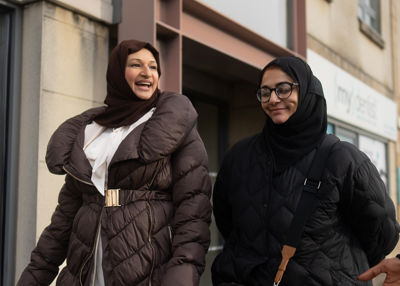Navigating Ramadan while living with an eating disorder: Jasmine's story
25/02/2025
A stock photo and pseudonym have been used on this blog at the request of the author.
Growing up as a British Pakistani Muslim, food has always been central to family life for Jasmine. But with lived experience of an eating disorder, she discusses the challenges of navigating Ramadan and fasting.
A complex relationship with food
In South Asian culture, food isn’t just survival - it symbolises love, nurture and closeness. Food expresses what words cannot and brings generations together even during moments of conflict.
Refusing food can be looked at as a rejection of love and respect, especially towards elders.
As someone who has a long history of Eating Disorders, I’ve often felt caught between cultural expectations and personal battles. While at my worst with Anorexia Nervosa, I remember relatives who were angry at me for not eating what they loaded onto my plate. Yet the same people praised my appearance while I was declining. For them, it was aspirational. For me, it was positive reinforcement for my unhealthy behaviours.
Looking back, these seemingly innocent comments, solidified the idea that self-control and discipline were ultimate goals, making my recovery more challenging. Although my eating disorder had developed from various triggers, it’s undeniable that cultural pressures and expectations didn’t make my relationship with food better.
Cultural narratives often connect appearance with respectability and even marriageability. I’ve overheard conversations in my immediate circles, about the ideal daughter-in-law needing to be “petite”, “x weight” and “fair skinned”. Unwiring messages like these are a struggle for me, even more so during food-focused events and religious holidays like Ramadan.
-
I feared I was missing out, so when I did fast like everyone else, this soon spiralled into binge-restrict cycles.
Diet culture during Ramadan
Ramadan is a month of spirituality, self-reflection, and gratitude but people often assume that it is ONLY about fasting. This can reduce beautiful moments of connection to conversations about food and weight loss. Sadly, diet culture can get louder during Ramadan, through glamorising casual commentary like “Ramadan is the perfect time to detox and lose weight!”
As someone already battling my mind and constant loud thoughts about food and body image, hearing damaging remarks like these make my recovery during Ramadan even more challenging.
Challenges
At first, I feared I was missing out, so when I did fast like everyone else, this soon spiralled into binge-restrict cycles. I remember overeating at Iftar, in secret, then restricting through fasting the next day to compensate the immense guilt and shame I was trapped with – this was an exhausting, painful vicious cycle.
When I struggled with Orthorexia, fasting became a way to fixate on being “pure” and “clean”. Any perceived failure I’d make was judged harshly by the Eating disorder voice. If my Eating Disorder wasn’t pleased, I felt immense self-loathing.
Ramadan should be a time for joy and gratitude, but for me it became a scary ordeal.
-
I knew that if I wanted to prioritise my healing, I needed to step back.
Finding peace
I realised after an arduous internal battle, that fasting was damaging my recovery. Although I was never medically advised to not fast, I became aware of how hollow my existence became – both physically and mentally. I knew that if I wanted to prioritise my healing, I needed to step back.
Not fasting initially felt like I was failing, and I was consumed by how others would perceive me, but I reminded myself constantly that compassion is core in Islam.
Ramadan is so much more than fasting – and it is not meant to harm us. While I don’t participate in fasting for now, I’ve found there are other ways to celebrate this sacred month like giving to charity, focusing on kindness and prayer, and strengthening my relationship with Allah.
Letting go of fasting doesn’t make me less of a Muslim: it allows me to embrace the true essence of Ramadan while prioritising my recovery.



